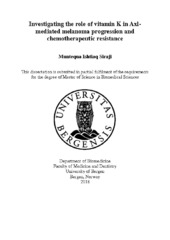| dc.description.abstract | Metastatic melanoma is a highly aggressive cancer with a very poor prognosis and current therapies remain inadequate. Norway is among the top five countries with the highest incidence of melanoma. Malignant cells carry oncogenic mutations that engender uncontrolled growth and elicit activation of epithelial-to-mesenchymal transition (EMT), an embryonic gene program that induces cancer stem cell features, invasiveness, survival, chemotherapeutic resistance, immune modulation and metastasis. The receptor tyrosine kinase, Axl, is upregulated with this EMT program and overexpressed in several human cancers. Axl is upregulated in a subset of more invasive tumors and thought to be an important facilitator of resistance to therapeutics targeted against oncogenic RTKs. Activation of Axl is dependent on the binding of its ligand Gas6. Gas6 is a vitamin K dependent protein that is modified by the γ-carboxylation of glutamic acid residues in the N-terminal Gla domain. Vitamin K serves as the cofactor for the enzyme γglutamyl carboxylase (GGCX) that catalyzes the γ-carboxylation of the glutamic acid residues. BGB324 is an Axl kinase inhibitor currently in ongoing clinical trial against different types of cancers. Here we first characterized the expression of Axl, Gas6 and vitamin K enzymes such as GGCX in 20 melanoma cell lines and determine their correlation with clinical outcome. Our results suggest that GGCX but not Axl and Gas6 expression correlates with poor patient prognosis. We further evaluated the effect of vitamin K and BGB324 on 5 selected cell lines. We found that the vitamin K increases the expression of Axl and other TAM receptors, GGCX and EMTrelated genes while when treated with BGB324 expression reduced or remained unchanged. However, BGB324 was not able to elicit this effect if the cells were cultured in vitamin K suggesting acquisition of a resistant phenotype. We also evaluated the effect of vitamin K on NZM cell proliferation, migration and spheroid formation. Finally, we show that vitamin K upregulated several plasticity markers in presence of vitamin K using mass cytometry (CyTOF). | en_US |
